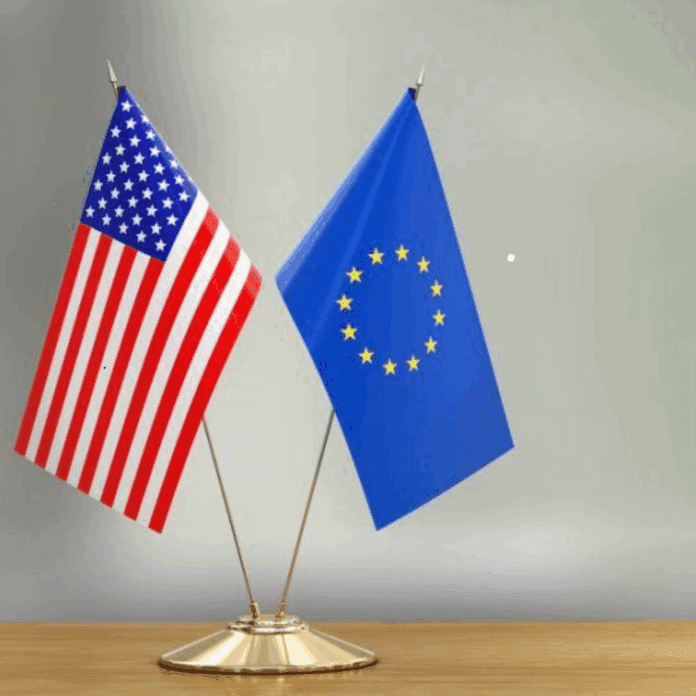Trump’s 50% Tariff Shock Puts Europe in Trade Trouble
President Donald Trump has once again rattled the global economy with a major announcement. Beginning on June 1, 2025, he vowed to impose a massive 50% tax on all items imported from the European Union (EU) on Friday. Trump made this bold declaration on social media, saying the EU has not been moving forward in trade talks. He added that these taxes would not apply if products are built in the United States.
Trump made it clear that he does not want a deal with the EU. In fact, he said the deal has already been set: a flat 50% tariff unless European companies build their products in America. The president’s statement was loud and clear invest in the U.S. or face high taxes.
The EU’s trade officials tried to ease the situation, saying they are working hard to secure a deal that works for both sides. They want fair and respectful trade relations, not threats. European leaders, however, remain firm in defending their countries’ interests while also hoping to find a solution through negotiations.
But Trump’s post was more than just words. Stocks in the U.S. took a hit after his announcement. The S&P 500 index dropped by 0.67%, showing how sensitive the market is to his comments. When Trump talks tariffs, investors worry.
25% Penalties on Smartphones: Apple and Others in Trouble
Trump’s trade war isn’t just about the EU. It also hits technology companies, especially those that make smartphones like Apple and Samsung. In a subsequent post, Trump threatened to impose a 25% penalty on Apple if it keeps producing iPhones in Asia rather than the United States. All devices manufactured outside of the United States, he emphasized. All devices manufactured outside of the United States, he emphasized. It could face this tax, including those from big brands like Samsung.
Trump said he told Apple’s boss that iPhones sold in America should be made in America. If not, Apple would have to pay a 25% tax on every phone imported. This would mean a major change for Apple, which currently makes most of its iPhones in India and some iPads in Vietnam.
UK Court Orders Apple to Pay $502 Million to U.S. Patent Firm Optis Over 4G Tech Dispute
Analysts say that if Apple moves its iPhone production to the U.S., the price of an iPhone could skyrocket. A $1,200 iPhone could jump to somewhere between $1,500 and $3,500. This could make it much harder for customers to afford the latest devices.
Trump’s demand could also hurt other tech companies, like Amazon and Walmart, which rely on imports to sell products at lower prices. If these tariffs go into effect, they will likely have to either raise prices for customers or take a hit on profits.
Tariffs: Who Pays the Price?
Trump has frequently asserted that the tariffs are paid for by other nations. In actuality, however, it is the importers, frequently Americans. These extra costs are usually passed on to shoppers through higher prices. For example, if Apple is forced to pay a 25% tariff on iPhones, the cost of a new phone will likely go up for customers.
Trump’s earlier tariff moves were aimed at China, but this time, the European Union and smartphone makers are the main targets. The president has also criticized the EU for having too many decision-makers, saying their system is slow and confusing. He believes the U.S. runs an unfair trade deficit with the EU, importing more goods than it exports.
The EU disagrees, saying the trade relationship is balanced when services like finance and technology are counted along with goods. However, tensions are rapidly increasing due to Trump’s aggressive stance and huge tariff threats.
Thorsten Frei Warns Europe: ‘Time to Hurt Russia Where It Bleeds’—Gas, Uranium, and Assets Targeted
Leaders in Europe have cautioned that these tariffs may harm the U.S. and European economies. They say higher taxes on goods will make it harder for businesses to grow and for people to afford the products they need.
Trump’s strategy of using big threats in trade talks has created a lot of uncertainty. Companies like Apple and Samsung, as well as major retailers, are unsure how to plan for the future. This makes it harder for them to decide where to build factories and how to price their products.
The situation is moving fast, and the trade war between the U.S. and Europe could have serious effects on the economy in the months ahead.
